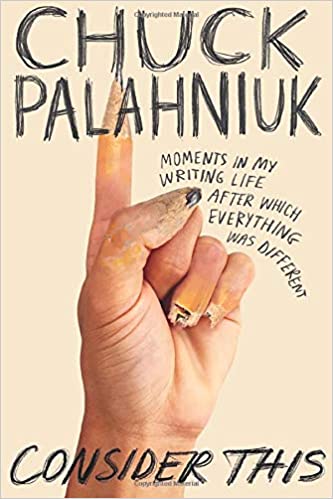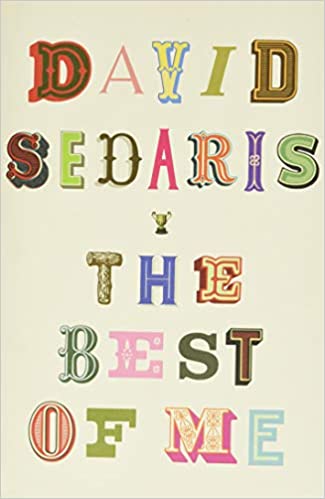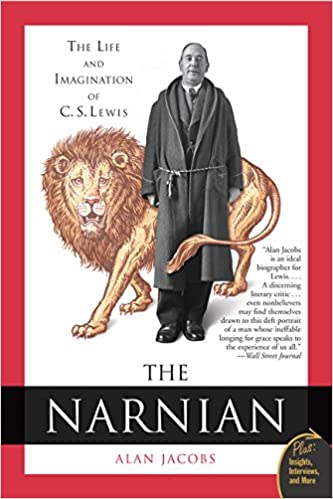It’s that time of year again where I compile a list of all the best books I’ve read since January and share them for anyone in need of a recommendation. I list them in the order I read them, so they aren’t ranked from best to worst or listed alphabetically or even by publication date. They are just here. Why I chose to read these books over others this year, I can’t say. My method of choosing what to read next is done more by feel than by logic: maybe I’m more in the mood for a good plot right now, so I read fiction; maybe I put a book on hold at the library several weeks ago that has just become available, so I read that one; maybe a book just came out that I think I have to read immediately; maybe a book was written centuries ago, and I think I should finally get around to reading it. There’s no rhyme or reason to it. So, by happenstance or by fate, here are the best books I read in 2020.
Consider This: Moments in My Writing Life after Which Everything Was Different by Chuck Palahniuk

This is Palahniuk’s book of writing advice for fiction writers. I do not aspire to be a fiction writer, but I found his advice to be solid and thought-provoking, worth trying out in my own writing. His anecdotes and stories were just as engaging as you’d expect (if you have any experience with his fiction), and I found myself not wanting this book to end. I want to read every story and book he recommended (and he recommended a lot). I also (briefly) wanted to try writing something. This was so good.
“Whatever the case, we recognize the truth when we read it. The best writers seem to read our minds, and they nail exactly what we’ve never been able to put into words.”
Biloxi by Mary Miller

This novel, set in Mississippi, follows the narrator, Louis, as his life changes, all because he was given a dog named Layla. He is retired, fat, and drinks too much, and he leads a rather anti-social life, sitting in his chair in his living room. The dog causes all sorts of events to unfold– often messy encounters with other people– but it also sparks a change in Louis, an evolution which is never obvious or sentimental. It made for a funny and surprisingly fun book to read.
“Life was a mystery. It was a goddamned mystery and I didn’t like it one bit. It was also the only thing worth living for.”
Same Old Story by Dawn Potter

This book of poems touches on themes of fairy tales, mythology, and the mundane, and I really enjoyed it. The poems are often story-like and not abstract, so they were more in line with what I enjoy and understand in poetry. I want to read more by her now.
“Though now we share this morning’s dose of loneliness.
God forbid
that we should mention such a thing.”
Emma by Jane Austen

Having only seen the movie and TV series, I felt the need to read the book to truly know the story and all the finer details that compression leaves out. It did not disappoint. Though it was long, it went into such detail of human gesture and interaction as to take me there and make me relate to the characters, their actions, motives, etc. Jane Austen is remembered and still read for good reason, in my opinion.
“Emma was sorry;– to have to pay civilities to a person she did not like through three long months!– to be always doing more than she wished, and less than she ought!”
Telling the Truth: The Gospel as Tragedy, Comedy, and Fairy Tale by Frederick Buechner

Wonderful. This was such an eloquent, poetic, and literary book, all the while showing just how the Gospel is truth as silence, as tragedy, as comedy, and as fairy tale. I love Buechner’s writing, and I love how it makes me think. I just want to write and talk with others about what he writes. I loved this. [Also recommended: Reading Buechner by Jeffrey Munroe, where I first read about Telling the Truth. Reading Buechner covers what the author believes to be the ‘essential’ books of Buechner’s to read, ranging from his novels to his memoirs and sermons, and it made me want to read all of his books immediately.]
“When they brought Jesus to the place where his dead friend lay, Jesus wept. It is very easy to sentimentalize the scene and very tempting because to sentimentalize something is to look only at the emotion in it and t the emotion it stirs in us rather than at the reality of it, which we are always tempted not to look at because reality, truth, silence are all what we are not much good at and avoid when we can. To sentimentalize something is to savor rather than to suffer the sadness of it, is to sigh over the prettiness of it rather than to tremble at the beauty of it, which may make fearsome demands of us or pose fearsome threats.
[..]
But here standing beside the dead body of his dead friend he is not Gregory Peck. He has no form or comeliness about him that we should desire him, and as one from whom men hide their faces we turn from him. To see a man weep is not a comely sight, especially this man whom we want to be stronger and braver than a man, and the impulse is to turn from him as we turn from anybody who weeps because the sight of real tears, painful and disfiguring, forces us to look to their source where we do not choose to look because where his tears come from, our tears also come from.”
The Total Money Makeover by Dave Ramsey

I would be remiss if I didn’t include this book in the best books I read this year– I really believe it is life-changing. I felt completely ignorant of money prior to reading this, except that I knew I don’t ever want to be in debt. Thankfully, I got that part right according to Ramsey, and he writes about where exactly to go from there and how. I feel so much more confident in the future now; this book and its principles have given so many people hope.
“Money is good for FUN. Money is good to INVEST. And money is good to GIVE. Most anything else you find to do with it doesn’t represent good mental and spiritual health on your part.”
Naive Super by Erlend Loe

I forget now how I first heard of this book, but I am happy I did. It is written in such simple language about a twenty-something having an existential crisis and finding his way out of it through realizing that there is meaning in life as well as love. There is no preachiness about it; no philosophies or ideologies are pushed. It was just a guy having a hard time until he’s not. I would easily read it again.
“My grandfather is a really good guy. I wonder whether I am a really good guy. I wonder whether there are any really good guys at all in my generation.”
Breaking Bread with the Dead by Alan Jacobs

The third of Jacobs’s books encouraging people to read and think better (after The Pleasures of Reading in an Age of Distraction and How to Think), this one focuses on the importance of engaging with past figures by reading what they wrote and enjoying and being challenged by them. I loved his concepts of temporal bandwidth and personal density and have already brought them up in so many conversations because of their relevance to our era.
“Fortunately, you don’t have to read the novel [Thomas Pynchon’s Gravity’s Rainbow] to grasp the essential point that one of its characters makes. That character is a German engineer named Kurt Mondaugen, and his profession perhaps explains the curiously technical language he uses to express his core insight. Here is the passage in which we learn about ‘Mondaugen’s law’:
‘Personal density,’ Kurt Mondaugen in his Peenemunde office not too many steps away from here, enunciating the Law which will one day bear his name, ‘is directly proportional to temporal bandwidth.’
‘Temporal bandwidth’ is the width of your present, your now. . . . The more you dwell in the past and in the future, the thicker your bandwidth, the more solid your persona. But the narrower your sense of Now, the more tenuous you are. It may get to where you’re having trouble remembering what you were doing five minutes ago.'”
What I Didn’t See and Other Stories by Karen Joy Fowler

A collection of short stories, these range in topic from John Wilkes Booth and his brother Edwin to fairy tale retellings and gorilla hunting (and so much more). Even thinking about some stories in particular (such as “King Rat”) make my heart hurt; they are that impactful. I just love how Fowler writes. (I first encountered Fowler by reading her novel We Are All Completely beside Ourselves, another well-written and surprisingly relatable story that I would highly recommend.)
“Have I been clear? I didn’t like Daisy and she didn’t like me and this was because neither one of us was likable.”
The Best of Me by David Sedaris

What is a best of list without mentioning Sedaris? Though his newest collection of stories– both fiction and non– doesn’t have any previously unpublished work and is sort of a ‘greatest hits’ (chosen by Sedaris himself), I still enjoyed reading it as I always enjoy reading anything by him. I hadn’t remembered reading some of the stories, even though I think I’ve read everything by him, so some felt new to me. And re-reading was nice, like I was checking in on a familiar friend. (I would also recommend his Kindle short, Themes and Variations, which is an essay on the themes that run through his book tours.)
“I didn’t have the analogy of the stovetop back then, but what I’d done was turn off the burner marked ‘family.’ Then I’d locked my door and sat there simmering, knowing even then that without them, I was nothing. Not a son or a brother but just a boy– and how could that ever be enough? As a full-grown man it seems no different. Cut off your family, and how would you know who you are? Cut them off in order to gain success, and how could that success be measured? What would it possibly mean?”
The Narnian: The Life and Imagination of C. S. Lewis by Alan Jacobs

Jacobs does a wonderful job of not only writing about Lewis’s life and writings but also shedding light and offering insight on the interplay between the two. Jacobs is such a gifted writer, and he makes Lewis seem like a complicated but deeply kind, intelligent, and passionate man who, once he came to Christianity at thirty, defended and embodied it for the rest of his life.
“Perhaps this is why Saint Francis, so the story goes, instructed his followers to ‘preach the Gospel always, using words if necessary.’ . . . After all, an apologist for Christianity, to some degree at least, commits himself or herself to answering questions that Jesus himself consistently refused to answer. [. . .]
But strange to say, there is a kind of language that, if it does not avoid such superficiality, nevertheless shows an awareness of that danger and in a sense can point beyond itself. I refer to the language of stories– perhaps especially the language of fantasy and fairy tale. Sometimes fairy stories may say best what’s to be said.”

